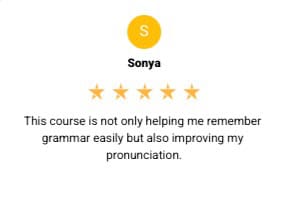Different Ways to Say “Sorry” in English
👇 Take this lesson with you! 👇
Table of Contents
In this lesson we will see how we use ‘sorry’ in English and also show you different ways to say ‘Sorry’ to apologise.
Before we begin, did you know most British people say sorry around 8 times a day? The interesting things is only 2 of those are to apologise! So we use ‘sorry’ for other reasons too, let’s find out why.
Saying ‘Sorry’ to make others feel comfortable
We often use ‘sorry’ to apologise, when we have done something wrong or made a mistake, for example when we bump into people.
However, interestingly most British people will say ‘sorry’ even when another person bumps into us!
I know, British people are a bit strange like that. I actually think it’s about making the other person feel comfortable, because we assume the bump was accidental.

Saying ‘Sorry’ to complain
British people will often say ‘sorry’ before making a complaint, particularly in a hotel, restaurant or even work setting. I think this is partly to do with making the complaint not sound too harsh, but it’s partly also just an automatic phrase we use.
I’m sorry, but the sheets on my bed are dirty.
I’m sorry, but this food is cold.
I’m sorry, but your late again, and it’s just not good enough.
Saying ‘Sorry’ to talk to strangers
An interesting cultural side to British people is that there is an unspoken rule that we never speak to strangers in public places.
We don’t socialise with strangers, in particular on a bus, in a queue, or waiting for a train. It’s just not done. Unless you want to ask for something or get some information. In that case, you can, but you would usually use ‘sorry’ to make it clear you are getting information (and not just socialising). I suppose ‘sorry’ here actually means ‘sorry to disturb you’.
Sorry, is this the right train for London?
Sorry, are you queueing for the bus?
Saying ‘Sorry’ to apologise informally
‘Sorry’ is by far the most common way to apologise in English, and you can use it in most contexts, including informal and more formal settings. Let’s look at some informal examples with family, friends, and also at work.
When meeting a friend but you arrive late, you might say,
I’m late – sorry!
I’m sorry, I’m late.
I’m sorry for being late
If you forget to send a report to a colleague, and they have just told you they haven’t got it, you might say
Oh, I’m sorry. I’ll send it right away.
We don’t always need to say ‘I am’, we can just say ‘sorry’ or even ‘sorry about that’.
If you are in a meeting and you mistakenly drink someone else’s coffee, you might say,
Oops, sorry about that!
When with friends and colleagues, we can also use the following phrases to apologise
- My bad
- My mistake
- My fault
- Sorry, my fault
- Sorry that was my fault
If you are getting a coffee for a friend or colleague and mistakenly put sugar in their coffee, you might say,
My bad, I’ll get you a new one
Sorry, my fault, I’ll get you a new one
Imagine you send an email to a colleague, and they have just told you that you forgot to put the attachment in the email. You might say,
My mistake, I’ll resend it now.
My bad, I’ll resend it right away!
Note: ‘My bad’ is a more common in the USA, but as popular American culture spreads across Britain, it is also becoming more common there now too.
Saying ‘Sorry’ to apologise in more formal situations
When we are in more professional situations, such as dealing with clients at work, in a hotel or a restaurant, we can use the following:
- My apologies
- Apologies
If you have booked a room at a hotel, but there is a problem with the booking, the hotel receptionist might say,
My apologies, I’ll sort that out immediately
I apologise, I’ll sort that out immediately
If you bought a product but there was a problem with the delivery, the seller might say,
I apologise for the inconvenience. We’ll send the correct order as soon as possible.
Saying ‘Sorry’ to apologise in serious situations
In more serious situations where you want to show your sincerity, particularly with your partner, you could use the following:
- Please forgive me
- I owe you an apology
Imagine you have had an argument with your partner, and you go to apologise afterwards. In order to show your sincerity and how serious you are taking the situation, you might say,
I’m so sorry. Please forgive me; I didn’t realise you were so upset.
Listen, I owe you an apology. I was overwhelmed, and I shouldn’t have shouted at you.

Saying ‘Sorry’ to apologise in formal situations
In very formal situations, especially in professional settings, you can use the following:
Please accept my sincerest apologies
If you sent a client an invoice that had several mistakes in it, and they are very angry, you might say,
Please accept my sincere apologies. I’ll review it and send a corrected version right away.
Finally, we use ’sorry’ to show our sympathy and share our condolences at a funeral. So when speaking to the family or friends or the person who died, you might say,
I’m sorry for your loss
I’m so sorry for your loss
My condolences, I’m so sorry for you loss
So, there we have different contexts where we use ‘sorry’ in Britain, not only to apologise but also to complain and even talk to strangers.
Improve your Speaking Skills with this Free Course
Crack IELTS Speaking Part 1
Learn to Speak with Confidence in Part 1 of Your IELTS Test!
⭐️⭐️⭐️⭐️⭐️
‘It’s such a great course. I’ve learned so many usages for speaking part 1.’
Zu Htet





